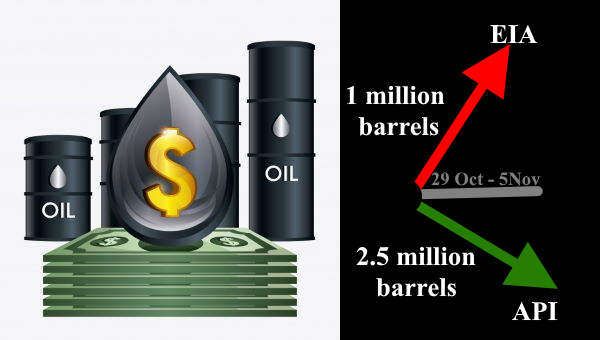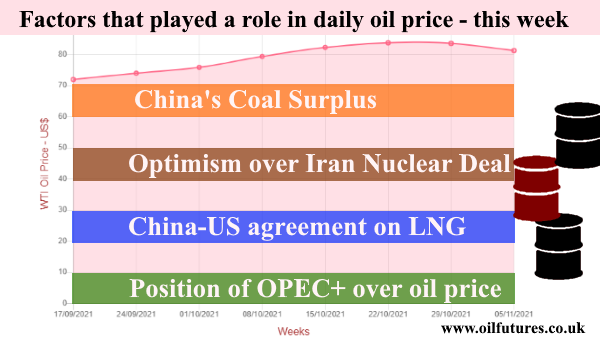The price of crude oil recovered on Monday defying
the worst-case scenarios as the world still needs oil to function in a normal
way. As of 15:00 GMT, the prices of WTI and Brent were $71.88 and $75.77 respectively.
Most analysts hoped that the prices would recover
gradually; many, however, did not…
Monday, 29 November 2021
Sunday, 28 November 2021
Responsibility of the OPEC+ after the oil price crash: will there be a more pragmatic apporach next week?
. With the discovery of the new variant of Covid-19
virus, Omicron, the prevailing optimism in the energy sector has started
evaporating, almost mimicking dew on a leaf on a calm summer morning. It was a bolt from the blue, indeed; it, once again,
demonstrated how vulnerable we are despite the advent…
Saturday, 27 November 2021
Plummeting oil price leaves the OPEC+ in a slippery lurch
The price of crude oil fell precipitously on Friday
when analysts were gauging the combined impact of the joint release of
petroleum reserves and the discovery of new Covid-19 variant in Southern
Africa. As of 18:00 GMT on Friday, the prices of WTI and
Brent were $68.15 and $72.72 respectively. When…
Wednesday, 24 November 2021
Gauging the oil price trend when two factors competing for dominance
The price of crude oil slightly dipped on Wednesday,
in line not necessarily with the cumulative release of the SPRs, Strategic
Petroleum Reserves, by the top global consumers. The drop coincides also with the latest data
released by the API, American Petroleum Institute, which showed yet another US…
Tuesday, 23 November 2021
Oil price: will the joint release of SPRs produce the desired outcome?
Crude oil investors are bracing themselves for the ‘big
news’ in the form of a public announcement by the world’s most powerful man in
the evening, with regard to the steps taken by his administration to cut down
on rising energy prices. Everyone expects that President Biden will address
the issue w…
Monday, 22 November 2021
Oil Price: relasing SPRs amidst waves of Covid-19 surges in Europe
The price of crude oil that has been falling during
the past three weeks recovered slightly on Monday when the markets opened for
the business for the new week. As of 11:45 GMT, the WTI and Brent were back in the
green, both standing at $76.08 and $79.00 respectively, recording modest gains.
The pri…
Friday, 19 November 2021
Joint release of SPRs and Covid-19 flare-ups in Europe bring down the price of crude oil
The price of crude oil continues to fall on Friday
as the news of the joint release of Strategic Petroleum Reserves, SPRs, started
gathering momentum, although there is no official response in this regard from
any country involved in the unprecedented move. As of 15:30 GMT, price of WTI and Brent st…
Thursday, 18 November 2021
Oil Price: Is the US planning a collective SPR onslaught to tame the crude oil markets?
The price of crude oil tumbled on Wednesday in the
aftermath of Biden-Xi talks that took place virtually on Tuesday. Although both sides were tight-lipped about what
were under discussion during the three-and-half-hour long conversation, the
Chinese media started guessing the contents in dribs and d…
Tuesday, 16 November 2021
Oil Price: Arctic blast across northern Europe may push the price up - further
An Arctic blast is set to hit the northern Europe in
the next few days, making both the temperatures and the continent’s cumulative natural
gas supply plummeting in a significant way. The above weather model shows how the extreme
weather front is moving across the region in the next few days. The pr…
Sunday, 14 November 2021
The reluctance of Biden administration to tap into SPR: a litmus test to gauge the success of the talks on the JCPOA!
The price of crude oil has been falling for three
successive weeks and analysts attribute it to a series of factors, ranging from
strong dollar to loss of consumer confidence, especially in the major
economies. When the markets closed on Friday, WTI and Brent
stood at $80.79 and $82.17 respectively. …
Thursday, 11 November 2021
Oil price continues to rise between two contradictory US inventory reports
The inexplicable fluctuation of crude oil continued
on Thursday, perhaps fuelled by the anticipation of a potential move by the US
to calm the crude oil markets. As of 14:45 on Thursday, the price of WTI and Brent
were at $81.83 and $83.19 respectively. The US crude oil inventories, according to the …
Wednesday, 10 November 2021
Crude oil price went up due to fallen US crude inventories
The US crude oil inventories dropped during the last
week, having been on the rise for six successive weeks, while defying the logic
of analysts. The API, American Petroleum Institute, reported on
Tuesday that the US crude inventories fell by 4.585 million barrels, exceeding
the expectations; the fo…
Monday, 8 November 2021
Plummeting temeratures in China adds more pressure on energy markets
The price of oil and other commodities is one of the
hot topics in the corridors of power in the world, regardless of the economic
status of the country in question, because the rising price of oil, gas and
coal have already taken its toll on the recovery of the global economy as a whole,
despite t…
Sunday, 7 November 2021
Factors that moved the crude oil price this week
Oil price fell slightly this week, having been
through unprecedented uncertainty. It, however, neither fell disastrously nor
increased dramatically due to outbreaks of the Delta variant of the Covid-19
and projected recovery in global demand respectively. The sole focus of attention was on the OPEC+…
Wednesday, 3 November 2021
What caused the significant fall in crude oil price on Wednesday? There may be more than one reason!
The price of crude oil recorded a relatively sharp
fall on Wednesday, defying the ‘prophesies’ of certain investment banks. As of
16:00 GMT, the price of WTI and Brent stood at $80.82 and $82.04 respectively,
a fall of more than 3%. The key reasons behind the fall of oil price may be
the following: C…
Subscribe to:
Comments (Atom)
Search for Articles
Popular Posts
-
The price stagnation of crude oil continues amid evolving tariff issues between the United States, the world's largest economy, and th...
-
Oil prices appear to be trending toward the mid-fifty dollar mark, a trajectory many analysts predicted months ago. As of 11:37 GMT on Wedne...
-
Global oil prices dropped on Friday before the weekend close, recording a second consecutive week of losses. As of 18:00 GMT, WTI crude stoo...
-
Saudi Arabia, whose economy relies heavily on exporting hydrocarbons, is currently facing double-headed challenge: on one hand, it has to ...
TOP CATEGORIES
Featured Post
Labels
Crude Oil Prices
(508)
Global Politics & Energy
(508)
Crude Oil Prices
(51)
featured
(8)
Gas Prices
(519)
Global Politics & Energy
(78)
Oil & Gas Market Analysis
(575)
Blog Archive
-
▼
2021
(261)
-
▼
November
(16)
- Oil price makes swift recovery defying the doom an...
- Responsibility of the OPEC+ after the oil price cr...
- Plummeting oil price leaves the OPEC+ in a slipper...
- Gauging the oil price trend when two factors compe...
- Oil price: will the joint release of SPRs produce ...
- Oil Price: relasing SPRs amidst waves of Covid-19 ...
- Joint release of SPRs and Covid-19 flare-ups in Eu...
- Oil Price: Is the US planning a collective SPR ons...
- Oil Price: Arctic blast across northern Europe may...
- The reluctance of Biden administration to tap int...
- Oil price continues to rise between two contradict...
- Crude oil price went up due to fallen US crude inv...
- Plummeting temeratures in China adds more pressure...
- Factors that moved the crude oil price this week
- What caused the significant fall in crude oil pric...
- With the Revival of the JCPOA in Jeopardy, Crude ...
-
▼
November
(16)





















